Filter by
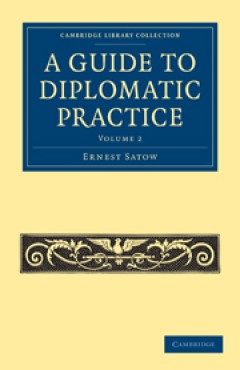
A Guide to Diplomatic Practice
Recruited straight from university, Ernest Satow (1843–1929) became one of the most respected British diplomats, particularly in Japan, where he is still remembered. After a career spent mostly in the rapidly developing Far East, he retired in 1906. Just before the outbreak of war, he was asked to compile a work on international diplomacy, and 'Satow', as it has become known, was first publis…
- Edition
- -
- ISBN/ISSN
- 9780511995194
- Collation
- -
- Series Title
- Cambridge Library Collection - British and Irish History, General
- Call Number
- -
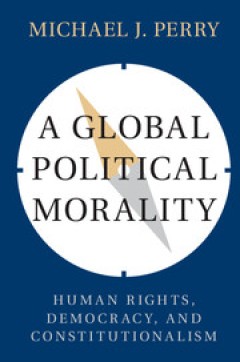
A Global Political Morality Human Rights, Democracy, and Constitutionalism
In A Global Political Morality, Michael J. Perry addresses several related questions in human rights theory, political theory and constitutional theory. He begins by explaining what the term 'human right' means and then elaborates and defends the morality of human rights, which is the first truly global morality in human history. Perry also pursues the implications of the morality of human righ…
- Edition
- -
- ISBN/ISSN
- 9781316665701
- Collation
- -
- Series Title
- -
- Call Number
- -

Lifestyle Politics and Radical Activism
This book is available as open access through the Bloomsbury Open Access programme and is available on www.bloomsburycollections.com. Attempts by people to enact their political beliefs in their daily lives have become commonplace in contemporary US culture, in spheres ranging from shopping habits to romantic attachments. This groundbreaking book examines how collective social movements have cu…
- Edition
- -
- ISBN/ISSN
- 9781441157430
- Collation
- -
- Series Title
- -
- Call Number
- -

The Emergence of Israeli-Greek Cooperation
This book offers a detailed account of the recent Israeli-Greek rapprochement. For more than six decades, relations between Greece and Israel were characterized by suspicion, mutual recriminations and hostility. However, in 2009, Greek policy was unexpectedly overturned. This volume examines this new relationship in detail and explores its theoretical and regional consequences. The Introduction…
- Edition
- 1
- ISBN/ISSN
- 978-3-319-12604-3
- Collation
- XIV, 186, 2 illustrations in colour
- Series Title
- -
- Call Number
- -
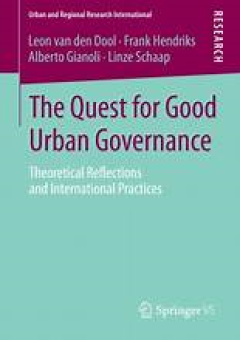
The Quest for Good Urban Governance
This book demonstrates both successes and failures in attempts to get closer to the ideal of good urban governance in cities in North-America, Europe, and Asia. It presents a value menu and deliberately does not come up with “one best way” for improving urban governance. Good urban governance is presented as a balancing act, an interplay between government, business and civil society in whi…
- Edition
- 1
- ISBN/ISSN
- 978-3-658-10079-7
- Collation
- X, 242, 9 b/w illustrations
- Series Title
- Urban and Regional Research International
- Call Number
- -
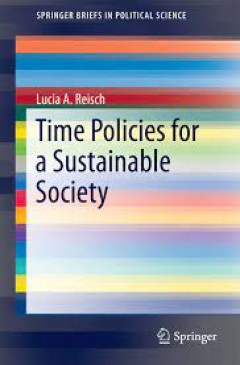
Time Policies for a Sustainable Society
This book explores time use, time policy, well-being and sustainable development using concepts and findings from time policy research, socio-ecological sustainability research, behavioral economics, consumer research, and research into prosperity and "the good life". Because any change in time structures, whether opening or working hours, school or travel times, has large scale impacts on…
- Edition
- -
- ISBN/ISSN
- 978-3-319-15198-4
- Collation
- -
- Series Title
- -
- Call Number
- -

A Democratic Bearing
In this rich analysis of the changing ideals of citizenship, Stephen K. White offers a path for the renewal of democratic life in the twenty-first century. Looking beyond passive notions of citizenship defined in terms of voting or passport possession, White seeks a more aspirational portrait, both participatory and inclusive, that challenges citizens, especially in the middle class, to confron…
- Edition
- -
- ISBN/ISSN
- 9781316717394
- Collation
- -
- Series Title
- -
- Call Number
- -
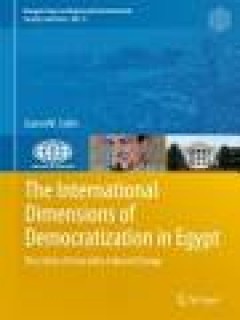
The International Dimensions of Democratization in Egypt
This book purports to examine the international dimensions of the democratization process in Egypt in the post Cold War era; a theme which acquired significance at the academic and policy-oriented levels in light of the growing internationalization of reform arrangements in the Arab world in post 9/11 and the greater involvement of external powers in Arab politics following the Arab Spring upri…
- Edition
- 1
- ISBN/ISSN
- 978-3-319-16700-8
- Collation
- XVI, 179, 1 b/w illustrations, 6 illustrations in colour
- Series Title
- Hexagon Series on Human and Environmental Security and Peace
- Call Number
- -
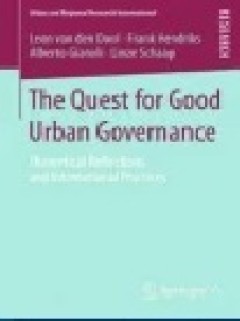
The Quest for Good Urban Governance
This book demonstrates both successes and failures in attempts to get closer to the ideal of good urban governance in cities in North-America, Europe, and Asia. It presents a value menu and deliberately does not come up with “one best way” for improving urban governance. Good urban governance is presented as a balancing act, an interplay between government, business and civil society in whi…
- Edition
- -
- ISBN/ISSN
- 978-3-658-10079-7
- Collation
- X, 242
- Series Title
- Urban and Regional Research International
- Call Number
- -
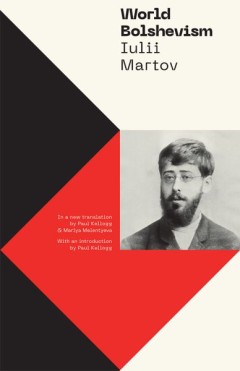
World Bolshevism
Following Martov’s untimely death in 1923, a Russian-language edition of one of his books, World Bolshevism, was published. But it was only in 2000, after decades of extreme censorship, that parts of the book were legally published in Russia. In English, this work has reached the public in pieces, often as a part of pamphlets with limited circulation. This edition, which includes an introduct…
- Edition
- -
- ISBN/ISSN
- 9781771992732.01
- Collation
- -
- Series Title
- -
- Call Number
- 194 pages
 Computer Science, Information & General Works
Computer Science, Information & General Works  Philosophy & Psychology
Philosophy & Psychology  Religion
Religion  Social Sciences
Social Sciences  Language
Language  Pure Science
Pure Science  Applied Sciences
Applied Sciences  Art & Recreation
Art & Recreation  Literature
Literature  History & Geography
History & Geography